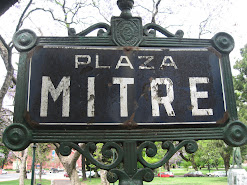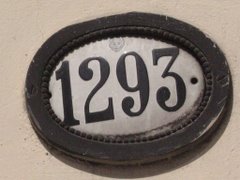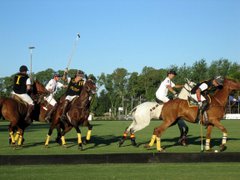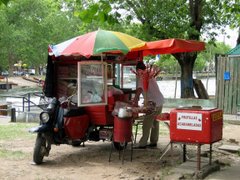The madness of fútbol Argentino was on display this week in La Plata where Boca Juniors and Gimnasia played Wednesday afternoon.
Actually what was contested was the second half of a September 10th match that had been suspended by the referee who said he'd been strongly reprimanded during the break by Gimnasia's president, Juan José Muñoz. Noboby knows what motivated that locker room visit - Muñoz's team was beating the champions 1-0, and were playing with "un cuchillo entre los dientes," (a knife between their teeth).
But an entirely different Gimnasia showed up for the second half nearly two months later. A lethargic squad gave up two quick goals and went on to lose to Boca 4-1. The former "iron opponent" played so badly that the accusations were immediate: Gimnasia's players had taken the dive. On Thursday sports paper Olé (owned by Clarín) reported that the team had received death threats from the barrabrava (hardcore, often violent, gangs associated with each team). The apparent reason was that Estudiantes were only a point behind first place Boca. Come again? Gimnasia's own barrabrava had demanded the team lose to weaken local archrival Estudiantes´ chances of gaining the championship.
The gang´s leaders; Fernando Núñez, alias Torugo, Juan Pablo Córdoba, alias Papupa, and Cristian Camillieri, alias El Volador, later said that they had not been to the training facility on Tuesday. But the manager, Pedro Troglio, and several players had already admitted that a meeting had taken place. In fact the player Ariel Franco implied that something omnious was discussed.
A special prosecutor, Marcelo Romero, was assigned and Torugo and company got themselves a lawyer. The lawyer, Burlando, a fan of hair products and, oddly, Estudiantes, told reporters that the threesome had a very good relationship with Gimnasia´s players and that he himself had known the lads since they were kids. In fact he had already defended Cristian against charges of homicide and, "of course," inciting violence.
The players, summoned to appear on Friday, simply didn't show up. (Later they explained lamely that they had not received a citation). Muñoz did appear around midday, but now Romero himself wasn´t around - he had stormed out saying the players had shown a lack of respect. Romero finally returned and Muñoz told him, "I don´t know what happened."
Troglio is scheduled to appear today and the players have been rescheduled for Monday. (Olé also said that on Wednesday Troglio had avoided the usual pregame chat with reporters by hiding in the bathroom).
From what I've seen and heard, just about every team in the league has been seriously threatened by their barrabravas, although more often the demand is for a win. When River lost a few games early in the season the player´s tires were slashed and the manager Passarella received death threats. I feel sorry for the players who must keep straight whether they´re to play like their lives depend on it or lie down on the job. "Che, tenemos que ganar o perder?" "No sé boludo."
So is anyone expecting the special prosecutor to make an indictment or the courts to actually punish anyone? Absolutely not. The prosecutor himself said that the investigation will probably end in futility on Monday.
And where is Julio Grondona in all of this? The president of the Argentine Fútbol Federation said only that he hadn't seen anything and that he won't talk about any incidents. The man in charge of the quality and integrity of the only major team sport in Argentina plans to do what he always does, absolutely nothing.
FOLLOW UP
November 13, 2006
Following yesterday's Gimnasia v Velez match in La Plata, at least four reporters including Juan Manuel Allan of Olé, were attacked by fans outside the stadium. The reporters were left exposed to the unruly mob when they found the dressing room press gate locked and no police presence in the area. After being punched, kicked and threatened by the hooligans, the group of reporters managed to get back into the stadium and report the incident to police. Club officials later denied having deliberately locked the door but the police directly contradicted that statement.
Was this a shameful act of retribution by the club? Without question.
Adding to another dumb day for fútbol Argentino were the all-to-familiar events that unfolded in Avellaneda during a match between archrivals Independiente and Racing. Less than midway through the second half and down 2-0, Racing hooligans rioted and forced famous World Cup referee Hector Elizondo to suspend the game.
Fútbol Argentino is in disarray and President Kirchner himself should take action although that is extremely unlikely.
A blog which may appeal to those who enjoy stories about people, politics, economics, sports, and travel. In and around Argentina and the USA.
11/11/2006
11/07/2006
Expats in Argentina

In July, El Expatriado,www.expat-argentina.com, blogspot.com, posted a very good analysis, "How Much Money Do You Need to Live in Argentina?" It's still generating comments in November. Here is an excerpt:
"Some other expats could chime in on this, but I think a pretty good way of estimating your standard of living here would be to take your U.S. Dollar income, multiply it by three, and then imagine living in New York, Chicago, or some other major American city with that income. I think that's a mental exercise that most of us could do."
OK, I will take the invitation and ring in with two cents or more. The 3X rule stated here is easily true. The reality can be even better than that with a little management. An American living in Buenos Aires and making say, $30,000(or 90,000 pesos), will probably enjoy a better standard of living and feel less financial stress than if he or she were making $90,000 and living in NY, Chicago, SF, Boston or LA. The terms "standard of living" and "quality-of-life" can get complicated, so let me clarify that I am talking about the affordability of basic goods and services. (Which is not to say quality-of-life measures such as cultural resources and access to natural wonders are not extremely good here. They are).
1. Housing. As El Expat points out, rents for like-apartments are typically more than three times less costly in Buenos Aires than in major US cities like New York. And buying an apartment will cost you about four to five times less. In major US cities, percentage of income dedicated to housing can get as high as 50%. In Buenos Aires it should be much less: %20-%30 would be a good target range. This means you'll have more money left over to enjoy everything else.
2. Transportation Unlike most Americans in the middle class or higher(excluding New Yorkers),expats in Buenos Aires usually don't own or need cars. On automotive expenses alone you'll save a fortune. Add cheap cabs ($2 to $5 for most cab rides) and nearly free buses and subways(.25c), and it's game over in this category. Note that transportation is linked with housing. You don't have to live in Recoleta or Palermo because you can get around quickly and inexpensively. Try Belgrano for example.
3. Food and entertainment. You will spend less than a third on restaurants, movies, drinks, theater etc. This is especially true if you mix in small neighborhood spots with your Olsens and Sushi Clubs. This is the land of $20-$25 dinners for two including a good bottle of malbec. And if you cook at home once in a while you will save even more. First run movies at nice multiplexes like Village Recoleta are $5.00 a ticket with a seat number you select. The popcorn is available salty or sweet.
4. Consumerism/Keeping Up With the Jones In Buenos Aires most expats will spend far less on general shopping and consumption. For one thing you won't have any access to Best Buy, Amazon and Banana Republic. The constant advertising won't reach you either(file under quality-of-life). And you won't have the pressure from friends and coworkers to buy all the latest electronic gadgetry and other so called durable goods (such as cars). Anyway you'll be too busy enjoying the city to miss your widescreen plasma and TiVo.
5. Taxes Don't think you're off the hook with the IRS, but as a bonafide resident of Argentina who is physically present in the country for 330 days during any period of 12 consecutive months, you may qualify to exclude income up to $80,000 of your foreign earnings.
If you work for an "indefinite or extended period and you set up permanent quarters for yourself and your family, you probably have established a bonafide residence in a foreign country, even though you intend to return eventually to the United States."
So to qualify you can't leave the country for more than a month in any given year. But you can spend your free time traveling around the beautiful country of Argentina.
"Some other expats could chime in on this, but I think a pretty good way of estimating your standard of living here would be to take your U.S. Dollar income, multiply it by three, and then imagine living in New York, Chicago, or some other major American city with that income. I think that's a mental exercise that most of us could do."
OK, I will take the invitation and ring in with two cents or more. The 3X rule stated here is easily true. The reality can be even better than that with a little management. An American living in Buenos Aires and making say, $30,000(or 90,000 pesos), will probably enjoy a better standard of living and feel less financial stress than if he or she were making $90,000 and living in NY, Chicago, SF, Boston or LA. The terms "standard of living" and "quality-of-life" can get complicated, so let me clarify that I am talking about the affordability of basic goods and services. (Which is not to say quality-of-life measures such as cultural resources and access to natural wonders are not extremely good here. They are).
1. Housing. As El Expat points out, rents for like-apartments are typically more than three times less costly in Buenos Aires than in major US cities like New York. And buying an apartment will cost you about four to five times less. In major US cities, percentage of income dedicated to housing can get as high as 50%. In Buenos Aires it should be much less: %20-%30 would be a good target range. This means you'll have more money left over to enjoy everything else.
2. Transportation Unlike most Americans in the middle class or higher(excluding New Yorkers),expats in Buenos Aires usually don't own or need cars. On automotive expenses alone you'll save a fortune. Add cheap cabs ($2 to $5 for most cab rides) and nearly free buses and subways(.25c), and it's game over in this category. Note that transportation is linked with housing. You don't have to live in Recoleta or Palermo because you can get around quickly and inexpensively. Try Belgrano for example.
3. Food and entertainment. You will spend less than a third on restaurants, movies, drinks, theater etc. This is especially true if you mix in small neighborhood spots with your Olsens and Sushi Clubs. This is the land of $20-$25 dinners for two including a good bottle of malbec. And if you cook at home once in a while you will save even more. First run movies at nice multiplexes like Village Recoleta are $5.00 a ticket with a seat number you select. The popcorn is available salty or sweet.
4. Consumerism/Keeping Up With the Jones In Buenos Aires most expats will spend far less on general shopping and consumption. For one thing you won't have any access to Best Buy, Amazon and Banana Republic. The constant advertising won't reach you either(file under quality-of-life). And you won't have the pressure from friends and coworkers to buy all the latest electronic gadgetry and other so called durable goods (such as cars). Anyway you'll be too busy enjoying the city to miss your widescreen plasma and TiVo.
5. Taxes Don't think you're off the hook with the IRS, but as a bonafide resident of Argentina who is physically present in the country for 330 days during any period of 12 consecutive months, you may qualify to exclude income up to $80,000 of your foreign earnings.
If you work for an "indefinite or extended period and you set up permanent quarters for yourself and your family, you probably have established a bonafide residence in a foreign country, even though you intend to return eventually to the United States."
So to qualify you can't leave the country for more than a month in any given year. But you can spend your free time traveling around the beautiful country of Argentina.
11/01/2006
Where Will George Be Ranked?

When George W Bush finally retires to the ranch he will come out near the top of the historical presidential rankings. Assuming he serves out the remainder of his second term, he will end up tied for second with 2922 days in office.
Actually Bush will be only the thirteenth man to pull off two full terms. The other twelve are Washington, Jefferson, Madison, Monroe, Jackson, Grant, Cleveland, Wilson, FDR(easily #1 with 3+ terms), Eisenhower, Reagan and Clinton. Truman, Teddy Roosevelt, Coolidge and Lyndon Johnson took over after the death of the sitting president and were elected to second terms. This group served anywhere from 1800 to 2800 days. Richard Nixon managed 2027 days in office.
Of the many great presidents with long tenures, Nixon is not one of them. Grant and Coolidge are also typically ranked among the poorest presidents of all time. So where will George W Bush end up in terms of achievement?
In a Quinnipac University poll from May of this year, Bush was picked as far and away the worst of the eleven chief executives since WWII. If scholars and historians end up agreeing with these respondents and George gets ranked below Nixon, he will slide in as the eleventh worst president of all time. But why stop there? The bottom ten beckons.
Admittedly, this a very tough club to break into. The current basement dwellers are (counting down): James Garfield, Zachary Taylor, John Tyler, Millard Fillmore, Ulysses Grant, William Henry Harrison, Andrew Johnson, Franklin Pierce, James Buchanan, and Warren G Harding. In this lot we find familiar stories of corruption, laziness and drinking. Let's focus on the man on the bubble: James A. Garfield. Could Garfield edge out George W in the final ratings?
Garfield served only 199 days of his term including 80 days on his death bed. After being shot twice in an assasination attempt, he spent nearly three months under the horrendous care of the doctors who eventually killed him. The best physicians in the land probed Garfield's chest wound with unsterilized fingers, accidentally punctured his liver, and never found the bullet. The famous story is that a newly invented metal detector malfunctioned because Garfield was lying on a metal bedframe. Garfield's condition deteriorated and he ended up dead from an aneurysm.
But in happier times Garfield could simultaneously write in Latin with one hand and in Ancient Greek with the other. (Can W scratch out his fraternity letters without breaking his pencil?) Garfield also has a Johnny Cash tune about him, was mentioned in a Clint Eastwood movie, and didn't make the entire world hate the United States. So yes, Garfield could pull off the upset.
If Bush does join Tippecanoe and Tyler too in the bottom ten, Democrats will have nothing to gloat about. We couldn't beat him with a sitting VP or a tall war hero with a deep voice. Of course Republicans will probably rig the vote and get GWB ranked ahead of Clinton.
No matter where he ends up on the all time list, George W has already been properly memorialized in his least favorite place on earth, northern California. For some reason San Francisco has a proud tradition of naming streets after terrible presidents. Always ahead of the game, the city already has one named for 43. Long after George is gone, his favorite people (liberals, freaks and gays) will be strolling along Fillmore, Taylor, Buchanan, Pierce, Harrison, Grant and Bush. For those keeping score at home, Garfield and Johnson are sadly not San Francisco street names. But Harding Park Golf Course is named for Warren G, an avid golfer who died at the Palace Hotel.
Tyler was excluded because he annexed the Republic of Texas and admitted the state of Florida in 1845.

Subscribe to:
Comments (Atom)



























































































